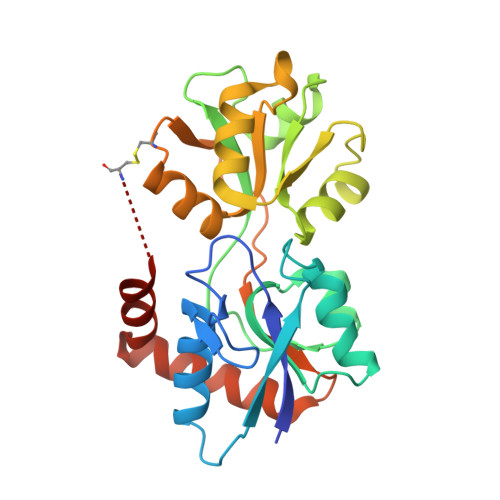The structural bases for agonist diversity in anArabidopsis thalianaglutamate receptor-like channel.
Alfieri, A., Doccula, F.G., Pederzoli, R., Grenzi, M., Bonza, M.C., Luoni, L., Candeo, A., Romano Armada, N., Barbiroli, A., Valentini, G., Schneider, T.R., Bassi, A., Bolognesi, M., Nardini, M., Costa, A.(2020) Proc Natl Acad Sci U S A 117: 752-760
- PubMed: 31871183
- DOI: https://doi.org/10.1073/pnas.1905142117
- Primary Citation of Related Structures:
6R85, 6R88, 6R89, 6R8A - PubMed Abstract:
Arabidopsis thaliana glutamate receptor-like (GLR) channels are amino acid-gated ion channels involved in physiological processes including wound signaling, stomatal regulation, and pollen tube growth. Here, fluorescence microscopy and genetics were used to confirm the central role of GLR3.3 in the amino acid-elicited cytosolic Ca 2+ increase in Arabidopsis seedling roots. To elucidate the binding properties of the receptor, we biochemically reconstituted the GLR3.3 ligand-binding domain (LBD) and analyzed its selectivity profile; our binding experiments revealed the LBD preference for l-Glu but also for sulfur-containing amino acids. Furthermore, we solved the crystal structures of the GLR3.3 LBD in complex with 4 different amino acid ligands, providing a rationale for how the LBD binding site evolved to accommodate diverse amino acids, thus laying the grounds for rational mutagenesis. Last, we inspected the structures of LBDs from nonplant species and generated homology models for other GLR isoforms. Our results establish that GLR3.3 is a receptor endowed with a unique amino acid ligand profile and provide a structural framework for engineering this and other GLR isoforms to investigate their physiology.
- Department of Biosciences, University of Milan, 20133 Milan, Italy; andrea.alfieri@unimi.it alex.costa@unimi.it.
Organizational Affiliation:



















